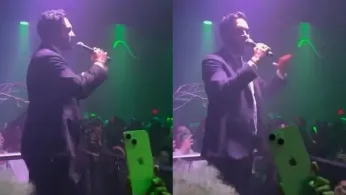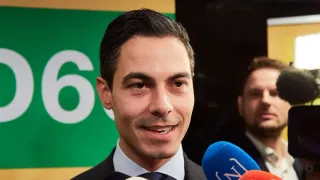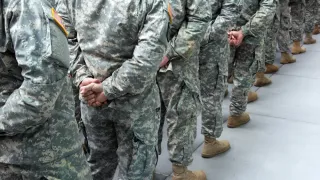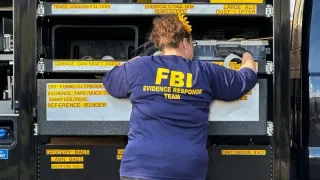
9 hours ago
Zohran Mamdani’s Midnight Gay Bar Rally Sparks Hope and Celebration in NYC’s Queer Community
READ TIME: 4 MIN.
It was well past midnight in Brooklyn, but the energy at Papi Juice was electric. The art and music collective, known for its vibrant celebrations of queer and trans culture, was still buzzing with revelers when Zohran Mamdani, the Democratic frontrunner for New York City mayor, walked in unannounced. The crowd erupted—some in disbelief, others in joy—as Mamdani grabbed the mic from the DJ booth and addressed the room with a message that resonated deeply: “Are we ready to beat Andrew Cuomo? Are we ready to win a city we can afford? Are we ready to make history?” The answer, shouted back from every corner of the room, was a resounding “Yes!” .
This wasn’t just a campaign stop—it was a moment of queer visibility, a reminder that LGBTQ+ spaces matter, and that politicians who show up authentically can inspire real excitement. Mamdani, who is of Indian origin and has run one of the most visible campaigns in recent memory, didn’t just drop by for a photo op. He danced, took selfies with costumed partygoers, and thanked Papi Juice for “creating a space for queer and trans New Yorkers” . In a city where queer nightlife has long been a sanctuary and a site of resistance, Mamdani’s presence felt like a victory in itself.
Mamdani’s approach to campaigning has been anything but traditional. Over the past few days, he’s visited six Brooklyn bars and nightclubs, from Gabriela to Damballa NYC, connecting with voters in spaces that reflect the city’s diversity and vibrancy. His bar crawl wasn’t just about winning votes—it was about meeting people where they are, literally and figuratively. At Damballa, he was seen dancing and singing with the crowd, embodying the spirit of a campaign that’s as much about joy as it is about policy .
But it was the stop at Papi Juice that captured the imagination of the queer community. The collective, which describes itself as “a space for queer and trans people of color,” has long been a beacon for those seeking safety, creativity, and celebration. Mamdani’s decision to show up at 1 a.m., during what was essentially an afterparty for their Halloween bash, sent a powerful message: queer spaces are not just places to party—they’re places to be seen, heard, and valued .
For many LGBTQ+ New Yorkers, Mamdani’s visit was more than just a campaign stunt. It was a recognition of the importance of queer nightlife, a sector that has faced significant challenges in recent years. From rising rents to the lingering effects of the pandemic, queer bars and clubs have struggled to survive. Yet, they remain vital spaces for community building, self-expression, and resistance. Mamdani’s presence at Papi Juice was a reminder that these spaces deserve support, not just from the community, but from those in power .
The moment also highlighted the growing importance of queer visibility in politics. Mamdani, who is straight, has made a point of centering LGBTQ+ voices and issues in his campaign. His endorsement of queer spaces, his willingness to show up in the middle of the night, and his genuine engagement with the community have earned him the trust and enthusiasm of many LGBTQ+ voters. As one attendee put it, “It’s not just about who wins the election—it’s about who shows up for us, even when it’s not convenient” .
Mamdani’s campaign has been marked by a sense of hope and solidarity, qualities that resonate deeply with LGBTQ+ communities. In a city that has long been a haven for queer people, his message of inclusion and affordability has struck a chord. As he told the crowd at Papi Juice, “Let’s go out and do it. Thank you, my friends” . These words, simple yet powerful, captured the spirit of a campaign that’s about more than just winning—it’s about building a city where everyone can thrive.
The event also underscored the importance of intersectionality in politics. Mamdani’s campaign has consistently highlighted the needs of marginalized communities, including LGBTQ+ people, people of color, and low-income New Yorkers. By showing up at Papi Juice, he demonstrated a commitment to these communities that goes beyond rhetoric. As one queer activist noted, “When politicians show up in our spaces, it’s a sign that they see us, not just as voters, but as people” .
As the New York City mayoral election approaches, Mamdani’s campaign continues to gain momentum. Polls show him leading by double digits, and his grassroots approach has energized a broad coalition of supporters . But for many LGBTQ+ New Yorkers, the real victory is not just in the numbers—it’s in the moments of connection, celebration, and solidarity that Mamdani has fostered.
As the city heads to the polls, the memory of Mamdani’s midnight rally at Papi Juice will linger. It was a reminder that politics can be joyful, that queer spaces are worth fighting for, and that representation matters. In a world where LGBTQ+ people are still too often marginalized, Mamdani’s campaign offers a vision of a city where everyone can feel at home.






